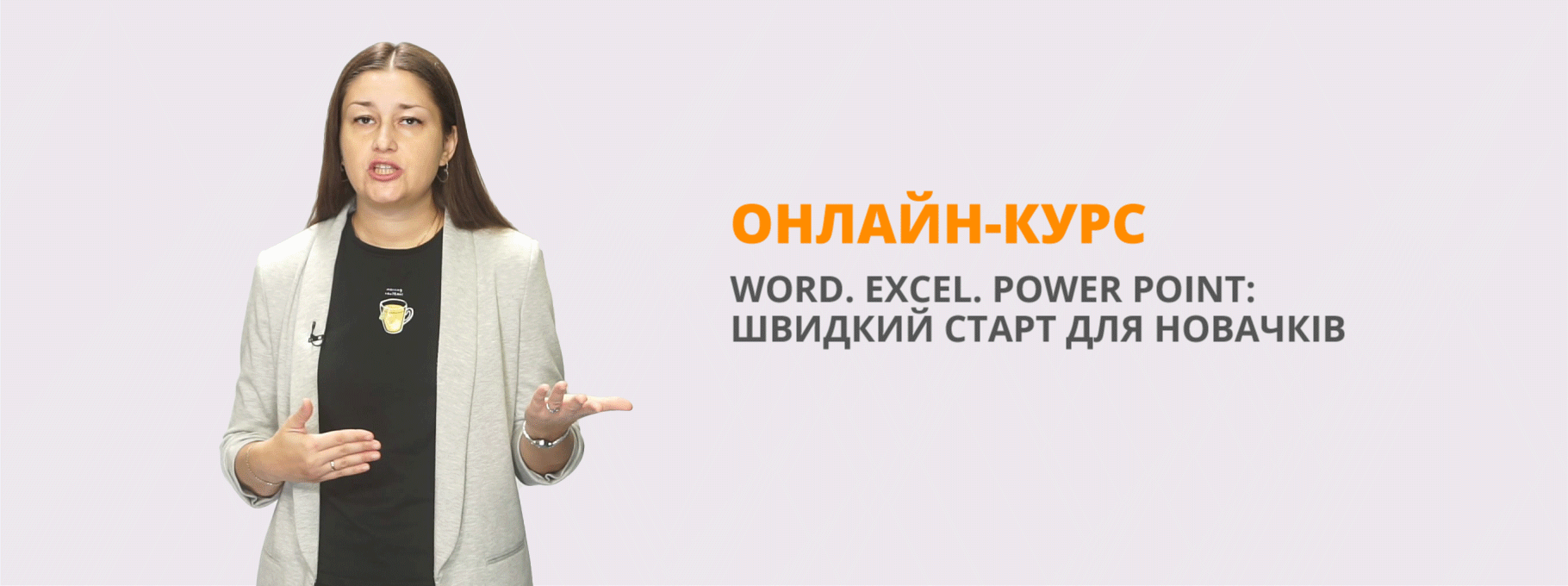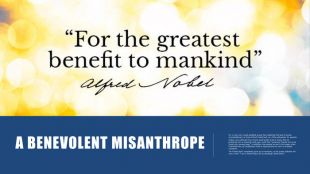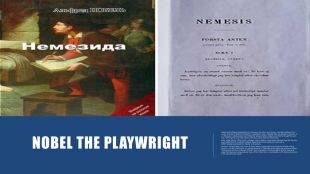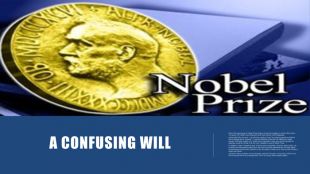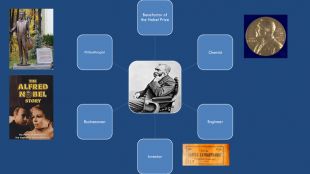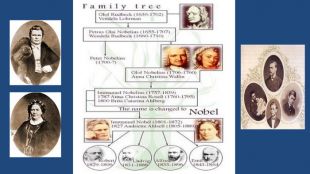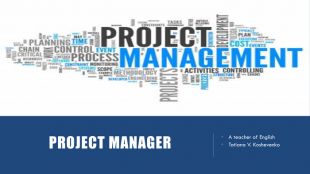ALFRED NOBEL: A MAN OF CONTRASTS
Мета:
Практична: удосконалювати навички читання, аудіювання, письма та усного мовлення учнів з теми;
Освітня: розширити кругозір учнів, поглибити знання учнів про науку, вчених і відкриття людства;
Виховна: виховувати усвідомлення важливості освіти і знань в житті людини
Розвивальна: розвивати творчі здібності, пам'ять, увагу, вміння логічно і послідовно викладати свої думки;
Тип уроку: урок-практикум
Форми роботи: групова, індивідуальна, фронтальна, парна
Інноваційні методи та інтерактивні технології, застосовані на уроці:
Mind-mapping, Brain storm, Project
On the 185th anniversary of Alfred Nobel's birth here's a look at some surprising facts about Nobel's life and legacy.
You may know that after a lifetime of working with explosives, Alfred Nobel wanted the fortune he'd earned to be used to create Nobel Prizes in the fields of chemistry, medicine, physics, literature and peace. However, there's much more to this 19th century scientist's story. Here are a few surprising facts about Nobel's life and death:
A Benevolent Misanthrope
For a man who would establish prizes that celebrate the best in human accomplishment, at times Alfred Nobel had very little enthusiasm for people.
Nobel, who suffered from chronic bad health, lived a lonely life; he preferred not to entertain and once wrote that "numerous friends are to be found only among dogs." In addition, the people he met in his career often frustrated him, as competitors tried to appropriate his work on multiple occasions.
Yet Nobel didn't completely give up on humanity, as his prizes indicate. He once wrote: "I am a misanthrope, but exceedingly benevolent."
Nitroglycerin Man
Nobel's reputation and fortune were built on his work with nitroglycerin. He invented an igniter that made it possible to control the unstable compound's explosions, then figured out how to combine nitroglycerin with silicon-containing earth in order to create the more stable dynamite. Later in his career, Nobel also used nitroglycerin to make blasting gelatin and ballistite (smokeless powder).
In Nobel's lifetime, nitroglycerin was also found to have medicinal uses. And when Nobel experienced heart problems himself, doctors directed him to take the compound. Nobel recognized the absurdity of the situation, noting, "[I]t seems an irony of fate that they should be prescribing nitroglycerin internally for me!"
Nobel the Playwright
Nobel had a lifelong appreciation for literature. He often wrote poetry, and also drafted a few novels. And shortly before his death, he completed a play, Nemesis, that was based on the story of a 16th century noblewoman who'd killed her abusive father. Nobel wrote that he thought his work was "rather good," and 100 copies of the play were made for distribution.
After Nobel died in 1896, family members tried to destroy those copies because they felt the play could undermine his reputation. Despite these efforts, three copies survived, and in 2005 Nemesis premiered at a theater in Stockholm.
However, though Nobel was a man of many talents, apparently his skills did not include writing drama — so don't feel bad if you missed the show. A Guardian article about the premiere stated: "According to the show's director, Rikard Turpin, Nemesis is a lurid parade of torture, rape and incest that features a drug-induced vision of the Virgin Mary, a conversation with Satan and ends in a 40-minute torture scene."
Nobel and Peace
Throughout his life, Nobel didn't see his work with explosives as something he had to atone for. Most of his nitroglycerin products were put to use in fields like mining and communications (though ballistite was used in firearms). Of course there were military applications for all his explosives, but Nobel felt that "there is nothing in our world that cannot be misused."
In addition, Nobel believed that increases in destructive power might lead to peace. In 1890, he wrote, "On the day when two armies will be able to annihilate each other in one second, all civilized nations will recoil from war in horror and disband their forces." And Nobel, who was friends with peace activist Bertha von Suttner, told her, "Perhaps my factories will put an end to war sooner than your [peace] congresses."
However, Nobel's views did evolve to the point that he chose to establish the Nobel Peace Prize in order to honor those who "have done the most or the best work for fraternity between nations, for the abolition or reduction of standing armies, and for the holding and promotion of peace conferences" — a decision that many attribute at least in part to his ongoing discussions with von Suttner. In 1905, she won the Peace Prize herself.
Feared Being Buried Alive
In the 19th century, it wasn't uncommon for people to worry about being live burial (Edgar Allan Poe's "The Premature Burial" was published in 1844). In fact, Nobel's father was afraid of such a fate — at one point, he wanted to build a coffin that allowed its occupant to call for help, just in case.
It turns out that Nobel shared his father's fears of being entombed alive, and placed instructions in his will to prevent this: "It is my express will and injunction that my veins shall be opened after my death." Only after "competent doctors [had] noted definite signs of death" did Nobel want his body cremated.
A Confusing Will
Given the importance of Nobel Prizes today, it's hard to imagine a world without them. Yet issues with Nobel's last testament mean that's almost what happened.
Nobel didn't like lawyers — he felt they made a living "by inducing people to believe that a straight line is crooked" — and he therefore wrote his will without any legal counsel. This helps explain why Nobel never checked to make sure that the groups he selected would be willing to do the work needed to award Nobel Prizes.
In addition, Nobel wanted the bulk of his fortune to establish a fund for these prizes, yet he didn't provide specifics about how that fund would be administered. Yet more issues arose because some family members were not happy to lose out on what would've been a large inheritance.
Obviously these problems were eventually resolved. However, it took time, which is why the first prizes were not awarded until 1901, five years after Nobel's death.
УРОК З АНГЛІЙСЬКОЇ МОВИ (9 КЛАС)
ТЕМА: «ALFRED NOBEL. A MAN OF CONTRASTS »
Мета:
Практична: удосконалювати навички читання, аудіювання, письма та усного мовлення учнів з теми;
Освітня: розширити кругозір учнів, поглибити знання учнів про науку, вчених і відкриття людства;
Виховна: виховувати усвідомлення важливості освіти і знань в житті людини
Розвивальна: розвивати творчі здібності, пам’ять, увагу, вміння логічно і послідовно викладати свої думки;
Тип уроку: урок-практикум
Форми роботи: групова, індивідуальна, фронтальна, парна
Інноваційні методи та інтерактивні технології, застосовані на уроці:
Mind-mapping, Brain storm, Метод проектів
Обладнання: підручник з англійської мови для 9 класу (Буренко В.М. - Харків: Вид-во «Ранок», 2017), виставка портретів англомовних вчених та винахідників; добірка прислів’їв і цитат про науку; комп’ютер; презентація; дидактичний ілюстративний матеріал.
Структура уроку з хронометражем
І. ПІДГОТОВКА ДО СПРИЙНЯТТЯ ІНШОМОВНОГО МОВЛЕННЯ
1. Привітання 1 хв.
2. Повідомлення теми та мети уроку 1 хв
3. Уведення в іншомовну атмосферу 5 хв.
4. Перевірка домашнього завдання 5 хв.
5. Фізкультхвилинка «Science and Technology Song» 1 хв.
ІІ. ОСНОВНА ЧАСТИНА УРОКУ
1. Читання 8 хв.
2. Аудіювання 10 хв.
Учнівська презентація 6 Surprising Facts about A. Nobel
3. Комунікативна діяльність 7 хв.
4. Food for thought 4 хв.
ІІІ. ЗАКЛЮЧНА ЧАСТИНА УРОКУ
1. Домашнє завдання 1 хв.
2. Підведення підсумків уроку 2 хв.
Хід уроку
І. ПІДГОТОВКА ДО СПРИЙНЯТТЯ ІНШОМОВНОГО МОВЛЕННЯ
1. Привітання
Т: Good morning, pupils! Nice to see you! How are you?
Ps: Nice to see you, too! We are fine, thank you!
2. Повідомлення теми та мети уроку
T: Today we are going to speak about something interesting. Our life is impossible without it. During the lesson we’ll read about some facts of history, geography, etc. It will be today that you’ll get to know new expressions on this topic, learn proverbs and quotations. Today we’ll speak about science and technologies, scientists and their inventions and discoveries. The motto of the lesson is “Necessity is the mother of invention”.
3. Уведення в іншомовну атмосферу.
Учні отримують картки Task 1 – A-Z of science and technologies
і працюють в групах по троє-п’ятеро. Учитель контролює правильність виконання завдання. Група-переможець отримує «приз».
4. Перевірка домашнього завдання
Учні, спираючись на заповнені умоглядні карти (mind-maps), по черзі виступають зі стислими повідомленнями про відомих вчених.
5. Фізкульхвилинка (відео)
ІІ. ОСНОВНА ЧАСТИНА УРОКУ
- Читання
Pre-reading activity
T: Have you ever heard about Alfred Nobel?
Ps: Of course, we have. Everybody knows about Nobel Prize.
T: What comes to mind when you think of Alfred Nobel? Work in groups and write your ideas below.
Учні отримують картки Task 2 – Alfred Nobel Mind Map
і працюють в групах. Учитель контролює правильність виконання завдання. Група-переможець отримує «приз».
While-reading activity
T: Read the text and try to understand the main idea of the text.
Учні отримують картки з читання Task 3 – A Man of Contrasts і працюють в парах.
Post-reading activity
T: Учні отримують картки Task 4 – Alfred Nobel Quiz
Учитель контролює правильність виконання завдання. Переможці отримують «приз».
2. Аудіювання
Pre-listening activity
T: Have you ever heard 6 surprising facts about Alfred Nobel? Look at the screen.
Post-listening activity.
3. Комунікативна діяльність
T: Let’s discuss new information about famous inventor.
4. Food for thought
T: Here are some famous quotes from Alfred Nobel. Can you match the two halves to make the quote? Compare your answers in groups. What does each quote mean?
Учні отримують картки Task 5 – Complete the Alfred Nobel quotes
і працюють самостійно або в групах. Учитель контролює правильність виконання завдання. Переможець або група-переможець отримує «приз».
ІІІ. ЗАКЛЮЧНА ЧАСТИНА УРОКУ
1. Домашнє завдання (слайд 23)
- Make a theme crossword
- Write a fairy-tale about science
- Create a presentation
- Write a letter to a famous scientist
- Make a table game about British Nobel Prize Winners
- Publish a bulletin about Ukrainian scientists
- Your own variant
- Підведення підсумків уроку
Бесіда в режимі Т-Р1-Р2-Р3.
T: Our lesson is coming to the end. Thanks for your good work! I believe this lesson was useful and interesting for you. What topic did we discuss at the lesson today? What have we done during the lesson?
Your marks are…
The lesson is over. See you later.

PROVERBS ABOUT SCIENCE
EXPERIENCE IS THE MOTHER OF SCIENCE.
TRADITIONAL PROVERB
THERE IS NO SCIENCE WITHOUT PATIENCE.
FRENCH PROVERB
RIVALRY BETWEEN SCHOLARS IMPROVES SCIENCE.
CHINESE PROVERB
TO LEARN ABOUT OTHER PEOPLE IS SCIENCE, TO LEARN TO KNOW YOURSELF IS INTELLIGENCE.
CHINESE PROVERB
A SWORD IN THE HANDS OF A DRUNKEN SLAVE IS LESS DANGEROUS THAN SCIENCE IN THE HANDS OF THE UNSCRUPULOUS.
IRANIAN PROVEB

QUOTES ABOUT SCIENCE
“SCIENCE IS THE SYSTEMATIC CLASSIFICATION OF EXPERIENCE.”
- GEORGE HENRY LEWES
“SCIENCE IS BUILT UP WITH FACTS, AS A HOUSE IS WITH STONES. BUT A COLLECTION OF FACTS IS NO MORE A SCIENCE THAN A HEAP OF STONES IS A HOUSE.”
- HENRI POINCARE
“SCIENCE IS ORGANIZED KNOWLEDGE. WISDOM IS ORGANIZED LIFE.”
- IMMANUEL KANT
“SCIENCE IS THE CAPTAIN, AND PRACTICE THE SOLDIERS.”
- LEONARDO DA VINCI
“MOST PEOPLE SAY THAT IT IS THE INTELLECT WHICH MAKES A GREAT SCIENTIST. THEY ARE WRONG: IT IS CHARACTER.”
- ALBERT EINSTEIN
“SCIENCE IS FUN. SCIENCE IS CURIOSITY. WE ALL HAVE NATURAL CURIOSITY. SCIENCE IS A PROCESS OF INVESTIGATING. IT’S POSING QUESTIONS AND COMING UP WITH A METHOD.”
- SALLY RIDE
“SCIENCE KNOWS NO COUNTRY, BECAUSE KNOWLEDGE BELONGS TO HUMANITY, AND IS THE TORCH WHICH ILLUMINATES THE WORLD.”
- LOUIS PASTEUR
Task 1 – A-Z of science and technologies
What does a word “science” mean to you?
Can you find more words for each letter?
|
A |
N |
|
B |
O |
|
C |
P |
|
D |
Q |
|
E |
R |
|
F |
S |
|
G |
T |
|
H |
U |
|
I |
V |
|
J |
W |
|
K |
X |
|
L |
Y |
|
M |
Z |
Task 1 – A-Z of science and technologies
What does a word “science” mean to you?
Can you find more words for each letter?
|
A - analysis |
N – Nobel Prize |
|
B - biology |
O |
|
C - chemistry |
P - phenomena, progress, prediction, physics |
|
D - discovery |
Q |
|
E - experiments, evidence, explanation |
R - research, result |
|
F - facts |
S - study, scientist |
|
G |
T - technology |
|
H - hypothesis |
U |
|
I - inventions, idea |
V |
|
J |
Winners |
|
K - knowledge |
X |
|
L - laboratory, logic |
Y |
|
M - Maths |
Z - zoology |
Task 2 – Alfred Nobel Mind Map
What comes to mind when you think of Alfred Nobel?
Work in groups and write your ideas below.

Task 2 – Alfred Nobel Mind Map
What comes to mind when you think of Alfred Nobel?
Work in groups and write your ideas below.
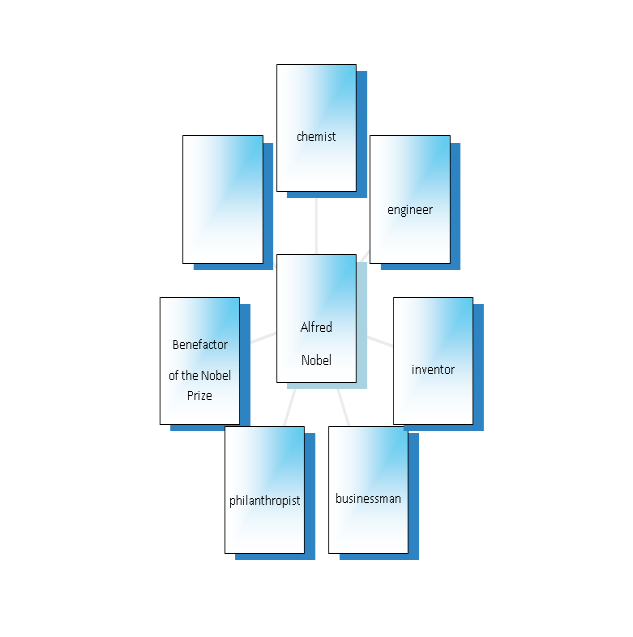
Task 4 – Alfred Nobel Mind Map
What comes to mind when you think of AlfredNobel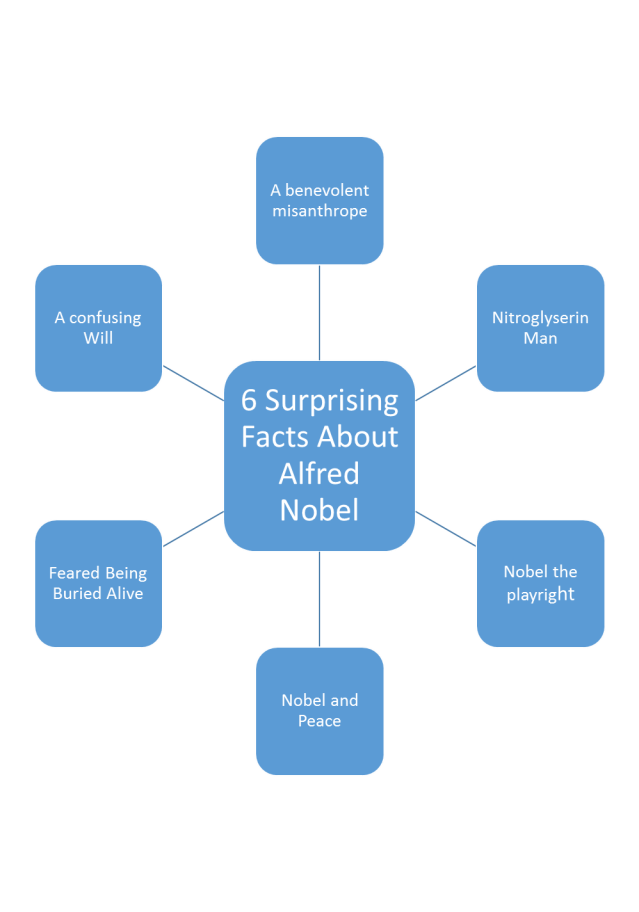
Task 3 – A Man of Contrasts
Alfred Nobel, the great Swedish inventor and industrialist, was a man of many contrasts. He was the son of a bankrupt, but became a millionaire, a scientist who cared for literature, an industrialist who managed to remain an idealist. He made a fortune but lived a simple life, and although cheerful in company he was often sad when remained alone. A lover of mankind, he never had a wife or family to love him, a patriotic son of his native land, he died alone in a foreign country. He invented a new explosive, dynamite, to improve the peacetime industries of mining and road building, but saw it used as a weapon of war to kill and injure people. During his useful life he often felt he was useless. World-famous for his works, he was never personally well-known, for while he lived he avoided publicity. He never expected any reward for what he had done. He once said that he did not see that he had deserved any fame and that he had no taste for it. However, since his death, his name has brought fame and glory to others.
He was born in Stockholm on October 21, 1833 but moved to Russia with his parents in 1842, where his father, Emmanuel, made a strong position for himself in the engineering industry. Emmanuel Nobel invented the landmine and got plenty of money for it from government orders during the Crimean War, but then, quite suddenly went bankrupt. Most of the family went back to Sweden in 1859. Four years later Alfred returned there too, beginning his own study of explosives in his father's laboratory. It so occurred that he had never been to school or University but had studied privately and by the time he was twenty was a skilful chemist and excellent linguist having mastered Swedish, Russian, German, French and English. Like his father, Alfred Nobel was imaginative and inventive, but he had better luck in business and showed more financial sense. He was quick to see industrial openings for his scientific inventions and built up over 80 companies in 20 different countries. Indeed his greatness lay in his outstanding ability to combine the qualities of an original scientist with those of a forward-looking industrialist.
But Nobel was never really concerned about making money or even making scientific discoveries. Seldom happy, he was always searching for a meaning to life, and from his youth had taken a serious interest in literature and philosophy. Probably because he could not find ordinary human love - he never married - he began to care deeply about the whole mankind. He took every opportunity to help the poor: he used to say that he would rather take care of the stomachs of the living than the glory of the dead in the form of stone memorials. His greatest wish, however, was to see an end to wars, and thus peace between nations; and he spent much time and money working for the cause until his death in Italy in 1896. His famous will, in which he left money to provide prizes for outstanding work in physics, chemistry, physiology, medicine, economics, literature and promotion of world peace is a memorial to his interests and ideals. And so the man who often believed that he was useless and had done little to justify his life is remembered and respected long after his death. Nobel's ideals which he expressed long before the threat of nuclear war have become the ideals of all progressive people of the world. According to Nobel's will the capital was to be safely invested to form a fund. The interest' on this fund is to be distributed annually in the form of prizes to those who, during the previous year, did the work of the greatest use to mankind within the fields of physics, chemistry, physiology or medicine, economics, literature and to the person who has done the most for brotherhood between nations, for the abolition or reduction of permanent armies and for the organization and encouragement of peace conferences.
In his will Nobel wrote that it was his firm wish that in choosing the prize winner no consideration should be given to the nationality of the candidates, but that the most worthy should receive the prize, whether Scandinavian or not. This will was written in Paris, on November 27th, 1895. Since Nobel's death many outstanding scientists, writers and public figures from different countries have become Nobel prize winners.
Task 4 – Alfred Nobel Quiz
How much do you know about Alfred Nobel? Try this quiz to find out:
01) When was Alfred Nobel born?
a) 1733
b) 1843
c) 1833
02) In which period of history was Alfred Nobel alive?
a) 18th century
b) 19th century
c) 20th century
03) Which of these was invented by Alfred Nobel?
a) landmine
b) dynamite
c) explosives
04) Where was Alfred Nobel born?
a) Saint Petersburg
b) Stockholm
c) Paris
05) How many companies did Alfred Nobel build up?
a) over 80
b) 39
c) 79
06) Which type of works did Alfred Nobel not write?
a) poetry
b) comedies
c) plays
07) What’s the name of his Alma Mater?
a) had studied privately
b) had never been to school or University
c) Magdalen College (Oxford)
08) How many patents did he held?
a) 355
b) 225
c) 125
09) What was his father’s occupation?
a) lawyer
b) engineer
c) bankrupt
10) Where did he die?
a) Russia
b) Italy
c) France
11) What age did he die?
a) 53
d) 73
c) 63
12) Where is his resting place?
a) Stockholm, Sweden
d) Sanremo, Italy

 c) Paris, France
c) Paris, France
Task 5 – Complete the Alfred Nobel quotes
 Here are some famous quotes from Nobel. Can you match the two halves to make the quote? Compare your answers in groups. What does each quote mean?
Here are some famous quotes from Nobel. Can you match the two halves to make the quote? Compare your answers in groups. What does each quote mean?
|
01. Home is where I work, |
A is usually a liar. |
|
02. Lying is the |
B yet utterly benevolent. |
|
03. The truthful man |
C worst poison. |
|
04. I am a misanthrope |
D and I work everywhere.
|
|
05. Worry is the stomach’s |
E only in imagination. |
|
06. Justice is to be found |
F greatest of all sins. |
|
07. Contentment is the |
G I am satisfied. |
|
08. If I have a thousand ideas and only one turns out to be good, |
H only real wealth. |
|
09. Good wishes alone |
I for hiding truth nakedness. |
|
10. Hope is nature’s veil |
J will not ensure peace.
|
Task 5 – Complete the Alfred Nobel quotes
 Here are some famous quotes from Nobel. Can you match the two halves to make the quote? Compare your answers in groups. What does each quote mean?
Here are some famous quotes from Nobel. Can you match the two halves to make the quote? Compare your answers in groups. What does each quote mean?
|
01. Home is where I work, |
A is usually a liar. |
|
02. Lying is the |
B yet utterly benevolent. |
|
03. The truthful man |
C worst poison. |
|
04. I am a misanthrope |
D and I work everywhere.
|
|
05. Worry is the stomach’s |
E only in imagination. |
|
06. Justice is to be found |
F greatest of all sins. |
|
07. Contentment is the |
G I am satisfied. |
|
08. If I have a thousand ideas and only one turns out to be good, |
H only real wealth. |
|
09. Good wishes alone |
I for hiding truth nakedness. |
|
10. Hope is nature’s veil |
J will not ensure peace.
|


про публікацію авторської розробки
Додати розробку
